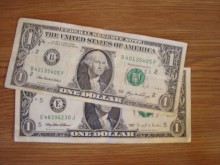Could You Manage Your Finances Without a Bank Account?
 How do you go through life without a bank account? How do you save money? Cash your paycheck? Pay your bills? Life without a bank account limits your access to secure places to build up assets and links to other financial products like loans. In the developing world, people are accustomed to living in an entirely cash-based economy, but in an advanced economy like the US, how is it possible that 8.2% of households (mostly low-income) got by without any sort of bank account in 2011?
How do you go through life without a bank account? How do you save money? Cash your paycheck? Pay your bills? Life without a bank account limits your access to secure places to build up assets and links to other financial products like loans. In the developing world, people are accustomed to living in an entirely cash-based economy, but in an advanced economy like the US, how is it possible that 8.2% of households (mostly low-income) got by without any sort of bank account in 2011?
Many low-income individuals are paid in cash, pre-paid cards (which are reloadable and used like regular debit cards), or paper checks. To convert prepaid cards or checks into cash, many of these people use check cashers, which, as the name indicates, will cash any check for a small fee. Many check cashers also offer bill-payment services via a direct relationship with utility providers (such as Comcast or the local electricity supplier), so customers can bring cash to the check casher, who will then send the money on to the utility provider (again, for a small fee).
Given that banks offer similar services without charging customers a fee for every transaction, why would people whose finances are so tight choose to use check cashers instead? In fact there are several reasons, and even among people who have a bank account, check cashers can sometimes be faster and easier to use. Check cashers are usually located in low-income neighborhoods and are open on nights and weekends, making it possible for people who work long hours or multiple jobs to access their services at any time. Someone walking home from a shift at 3am can cash their paycheck immediately after getting paid and pay the rent while they’re at it.
Check cashers may also be perceived as more transparent than banks, since they have simple fee structures which are posted clearly on the wall. Banking fees are often less clear, and low-income individuals are frequently surprised by unexpected fees for overdrafts or for dipping below the minimum balance requirement. Furthermore, people with too many overdrafts can get placed on black lists that prevent them from opening any bank accounts anywhere. One the other hand, cash-based transactions, or even prepaid card transactions, prevent overdrafts.
In the past, check cashers have been accused of imposing predatory business practices on low-income individuals who have no other options, but the industry has been changing in recent years. IPA Researcher Jonathan Zinman is working with New York-based check casher RiteCheck to develop and test an “impulse savings” program that allows customers to divert a small portion of their earnings to a savings account every time they cash a check. Zinman is testing a similar model with Community Trust Prospera, a credit union-check casher hybrid in San Jose, California. For more information on what IPA is doing to expand financial services to low-income individuals, check out our U.S. Household Finance Initiative here.












